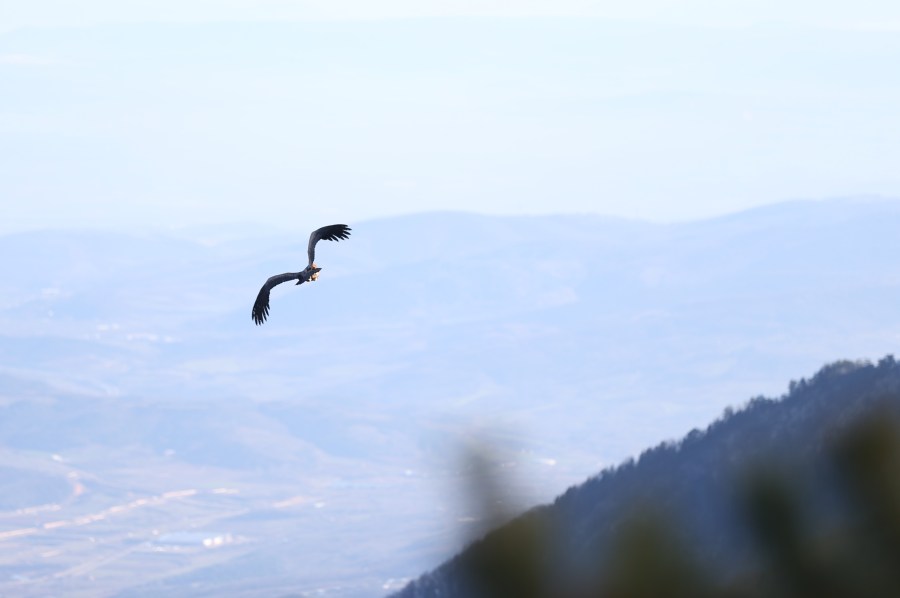As each year passes, if you’ve found yourself preferring to spend your nights and weekends in familiar haunts rather than exploring new places and meeting new people, you might be surprised to learn that this behavior isn’t that unusual in the animal kingdom.
Researchers from UCLA have found that, not unlike humans, a certain species of vulture does it too.
A study of eurasian griffon vultures, massive birds with nine-foot wingspans that live in the Mediterranean, India and the Middle East, found that, as the birds age, they have less desire to roost in new places with other vultures they aren’t familiar with.
Instead, they opt to return to their familiar roosting spots with individual birds they already know.
The research was published in Proceedings of the National Academy of Sciences and shows that vultures have “fewer, more selective friendships with stronger bonds” as they age.
Vultures are scavengers that eat animal carcasses, which can often be an unpredictable food source and occasionally hard to find. When they do find a carcass, they tend to roost nearby and feed on it for several days.
Roosting sites can be thought of as “information hubs,” researchers posited, where vultures that have recently fed signal to other birds that food is nearby. That leads to community and “friendships” that help the vultures stay informed about food sources.
Some roosts become popular for a reason, likely due to the availability of food. But young griffon vultures tend to shy away from those popular roosts, UCLA officials said, suggesting they may be intimidated by older birds.

The study found that young vultures usually chose new roosts to rest for the night, but rarely spent more than two days in the same place.
But as they reached middle-age, about 5 years old for the vultures, the “grind” of finding new roosts and food sources becomes tiring and they begin settling into familiar routines.
“They spent about half their nights at the same ‘home’ site and half elsewhere,” officials said. “In old age, they became true homebodies.”
The researchers set out to determine if a griffon vulture’s movement patterns and social behavior changed over the course of its life. They used GPS tags on 142 birds in Israel and tracked their movements over the span of a nearly unprecedented 15 years to monitor where they went and their time spent at certain roosts.
“What we found was, as they age, their loyalty to certain roost sites increases,” said Noa Pinter-Wollman, the study’s co-author and a UCLA professor of ecology and evolutionary biology. “Young vultures check out many different roosts but in middle age, they start going repeatedly to the same places.”
Even those that were considered “adventurous” in their middle age became more sedentary by the time they reached old age.
“When they are old, from the age of 10 onward, they no longer have the energy to be ‘out and about,’” said Orr Spiegel, a corresponding author from Tel Aviv University in Israel.

The similarities between humans and birds didn’t stop there.
Researchers also found that the birds became significantly less social as they got older.
“If they had five friends when young, they still had five when older. But the amount of time they spent with vultures outside of their close friend group plummeted,” UCLA officials said. “Older vultures spent most of their time with and roosted mostly with these close friends.”
Sound familiar?
While one might theorize that vultures tend to let their wild ways become a thing of the past because more adventurous birds live more dangerous and shorter lives, researchers say that’s not the case.
“Individuals actually change their behavior with age, and this has rarely been shown in nature for long-lived birds due to the difficulty of tracking individuals for such a long time,” said Marta Acácio, one of the researchers and study authors also from Tel Aviv University.
UCLA says the vulture research backs up similar findings in other studies of other species that show animals become more faithful to their known sites and routines as they age, and potentially become more picky with their inner circle — behavior commonly associated with aging humans.
Researchers say the information gleaned from this study could help improve the understanding of how animal populations move throughout their environments and relate to other members of their species and protect them from potential threats.
“It looks like they just get set in their ways,” Pinter-Wollman said. “They’ve gathered information over the years, and they might as well use it.”
To read more about the UCLA study, click here.
